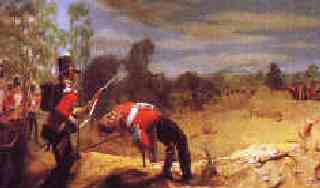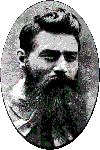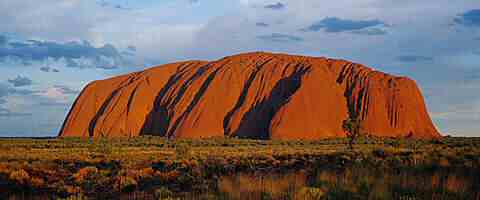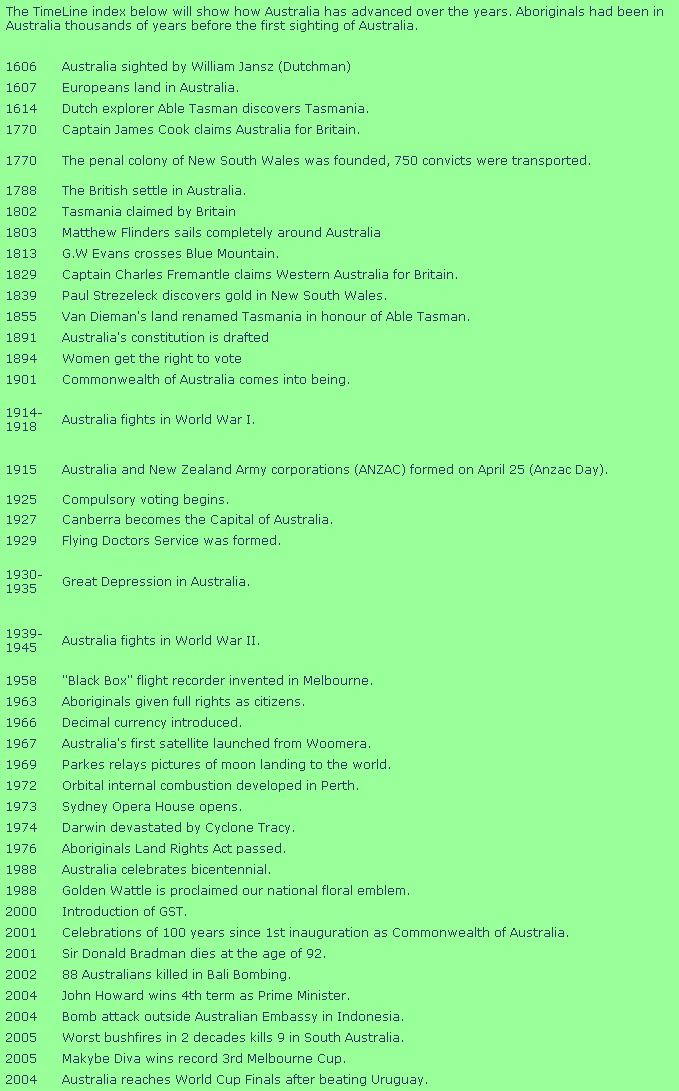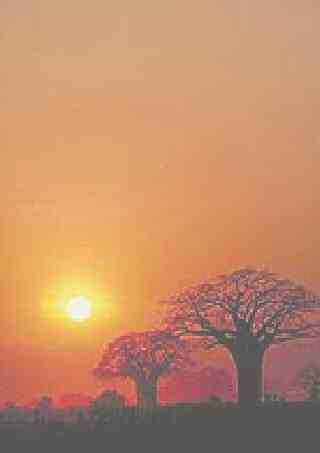AUSTRALIAN HISTORY
AUSTRALIAN HISTORIOGRAPHY

Culture inventions australian blog articles news reviews, reviews http://adventure--australia.blogspot.com.au/ Adventure Australia Blog Australian Adventure Blog Engineers Australia

In 1860 Robert Burke attempted to be the first person to travel across Australia from south to north. He joined with William Wills, John King, William Wright, and Charles Gray. Burke became impatient waiting for supplies at Coopers Creek, so he with Wills, King and Gray pressed on. A support group brought supplies dug a hole near a tree, buried the stores, then left. They carved "DIG" into the tree. When Burke, Wills, King and Gray returned to the base camp they did not find the water and food. Consequently, Burke, Wills and Gray died. King was helped by Aboriginals. He was found by a search party then returned to Melbourne.
Gold was discovered in Victoria in 1851, but by 1854 the easy surface gold working was finished. Miners then had to sink deep shafts to reach the lode of gold. The administration of the gold field was corrupt. It is increased licence hunts, which permitted a miner to work a 3.6 metre square claim, to twice a week. Furthermore, it wrongfully arrested an immigrant who had a license and acquitted a publican accused of murdering a miner. The hotel was burned to the ground and the mining area was barricaded against state troopers. A "Southern Cross" flag was hoisted in defiance of the authorities. Troopers arrested eight licence defaulters which inflammed the situation. When the troopers peceived the revolt to be weakening they attacked killing 22 stockaders. There was uproar throughout the state. Consequently, an export duty was placed on gold instead of the licences.
"I Love a Sunburnt Country" was a phrase coined by Dorothea Mackellar, who lived from the late 1800s to the mid 20th century. She lived a full life and saw many changes. Her philosophy reflected Australian thought and belief. Australian historiography notes the causative nature of this love of the outback. It drives Australians even today. Though most Australians live in coastal cities they still "look back" with affection to the old days when the land "drove" the Australian economy and the Australian way of life. This is the foundation of our Australian heritage. It began when Captain Cook arrived in Australia to proclaim the land for Britain. We do not forget that Aboriginals were here 40,000 years before this. However, there was a push from European nations to colonize "open" parts of the world, but the Portuguese and Dutch out of disinterest did not do this. Even Southeast Asians and Chinese who stopped here for medicinal herbs and fresh drinking water did not colonize the country.
An English 'gentleman' once said that Australia would never amount to anything because "mediocracy is the norm" in the antipodean colony. However, the nation has achieved quite a lot since the days when 'convicts' were brought here from England.
Australian historiography - When Captain Cook arrived in Australia it caused great change for Aboriginals. People came from Britain and European countries to make their way in the world by prospecting for gold or settling down.
The past has made us what we are today. Both old and new are moulded into Australia today. Cattle farmers are still held in high esteem as those who toil on the land to eke out a living: jackaroos, shearers, and horsemen of the Snowy Mountains are things of the outback that many believe will continue on forever despite the economic constraints. Australians who live in the more densely populated coastal areas honour this traditional Australian way, even as they themselves earn a living working in the service sector such as serving in department stores or providing technical services.
So we have a rich culture. Australia is an interesting place and offers much for visitors.
By Banjo Paterson
THE MAN FROM SNOWY RIVER
And the stock-horse snuffs the battle with delight.
For the bushmen love hard riding where the wild bush horses are,
Had mustered at the homestead overnight.
All the tried and noted riders from the stations near and far
So all the cracks had gathered to the fray.
And had joined the wild bush horses, he was worth a thousand pound,
That the colt from old Regret had got away.
There was movement at the station, for the word had passed around
Download Firefox
Windows Media
plugin manually
Windows Media
plugin manually

Tysaustralia


Is next page....

Eureka Stockade
Burke and Wills




Aboriginal Australians 40,000 years,Australian historiography, history wars.
The Australian Coat of Arms is included in Australian Historiography. History Wars.
According to Australian Historiography Captain Cook "discovered" Australia. History wars.
Adventure Australia Blog history wars Australian historiography
Dorothea Mackellar in Australian Historiography is a celebrated author. History wars.
Australia Historiography - continent was first sighted by William Jansz, a Dutchman, in 1606. History wars.
Australian Historiography covers old colonial maps. History wars.
Australian Historiography indicates that the Portuguese and Dutch had little interest in Australia.
Geoffrey Blainey published articles in Quadrant - Australian Historiography. History wars.
Southeast Asians have visited Australia for thousands of years - Australian Historiography. History wars.
A high point for Australian Historiography was when Canberra was established as Australia's capital in 1927.
In Australian Historiography Australians have been changed by this sunburnt country.
Bushrangers were important in Australia's past according to Australian Historiography. History wars.
Robert Manne wanted to end the History Wars debate. Australian Historiography.
The stolen generation was an issue in the History Wars debate. Australian Historiography.
History Wars revolved around The Rabbit Proof Fence Movie. Australian Historiography.
Macintyre was partisan in the History Wars issue. Australian Historiography.
Keith Windshuttle said few Aboriginals died - History Wars. Australian Historiography.
In the History Wars The National Museum did not favor Aboriginals. Australian historiography.
The Australian Coat of Arms is included in Australian Historiography. History Wars.
According to Australian Historiography Captain Cook "discovered" Australia. History wars.
Adventure Australia Blog history wars Australian historiography
Dorothea Mackellar in Australian Historiography is a celebrated author. History wars.
Australia Historiography - continent was first sighted by William Jansz, a Dutchman, in 1606. History wars.
Australian Historiography covers old colonial maps. History wars.
Australian Historiography indicates that the Portuguese and Dutch had little interest in Australia.
Geoffrey Blainey published articles in Quadrant - Australian Historiography. History wars.
Southeast Asians have visited Australia for thousands of years - Australian Historiography. History wars.
A high point for Australian Historiography was when Canberra was established as Australia's capital in 1927.
In Australian Historiography Australians have been changed by this sunburnt country.
Bushrangers were important in Australia's past according to Australian Historiography. History wars.
Robert Manne wanted to end the History Wars debate. Australian Historiography.
The stolen generation was an issue in the History Wars debate. Australian Historiography.
History Wars revolved around The Rabbit Proof Fence Movie. Australian Historiography.
Macintyre was partisan in the History Wars issue. Australian Historiography.
Keith Windshuttle said few Aboriginals died - History Wars. Australian Historiography.
In the History Wars The National Museum did not favor Aboriginals. Australian historiography.
It is the method of history writing formalized on selecting source materials into a final scholarly narrative.
It is, in short, a book or paper with explanations of historical causes and facts. That is historiography.
A work marked a turning point in his thesis on historiography. It is has also significant history on how democracy started. Historiography, and political science. Museums links website + resource
historiography study studies. student university college war heritage australia's government australian world indigenous aborigine aboriginal anzac trade social national foreign historiography people
menaffairs year period department coalition economic. land region australian modern australian international historiography women peoples nation national landed historian convicts population explorer
change territory federation institution australian contact federalism. Federal australian cultural canberra heritage capital government folklore portal historiography european harbour story
times services. parliament indigenous topic recreation defense century australian life colonization australian or pre post activities timeline events historiography dates chronology list document
democracy menu event year sea beach australian land development. Historiography diverse important compile milestone constitution invention science technology travel explore historiography journey
western historiography west. country troops australian liberal labor early transport australian election britain britishexplerience settlement hawke slang national actitities island article human part
commonwealth continent australian. Population colony military foundation historiography discovery discoveries territories colonization. united resources vote opportunity commission king queen retrieve
oceania settlers referendum historiography country areas proclamation australian authority treaty collection research events macquarie educational contact histories community page. site teacher
australian family historiography compendium australian genealogy categories historiography internet industrialisation exploration depression nation aussie map collection. Association gallery sources
resources professional historians manuscript. australia australian history library archives national sites state information historical online gov museum australian search www au - collections
museums links australian website historiography + resource study studies. student historiography university college war heritage australia's government australian world historiography indigenous
aborigine australian aboriginal anzac trade social national foreign people menaffairs year period department coalition economic historiography. Land region modern international women peoples
historiography nation national landed historian convicts population explorer change territory federation institution contact federalism federal australian cultural canberra historiography heritage capital
australian government folklore portal european historiography harbour story times services. parliament indigenous topic recreation defense century life colonization pre post activities timeline events
dates chronology list document democracy menu event year sea beach land development. Diverse or important historiography compile historiography australian milestone constitution invention science
technology travel explore journey western historiography west. country australian troops liberal labor early transport election britain britishexplerience settlement australian hawke slang national
actitities island article human part historiography. Commonwealth continent australian historiography population colony military foundation historiography discovery australian discoveries territories
colonization. united resources vote opportunity commission king queen retrieve oceania settlers referendum country areas or proclamation historiography authority treaty collection research events
macquarie educational contact australian histories.
It is, in short, a book or paper with explanations of historical causes and facts. That is historiography.
A work marked a turning point in his thesis on historiography. It is has also significant history on how democracy started. Historiography, and political science. Museums links website + resource
historiography study studies. student university college war heritage australia's government australian world indigenous aborigine aboriginal anzac trade social national foreign historiography people
menaffairs year period department coalition economic. land region australian modern australian international historiography women peoples nation national landed historian convicts population explorer
change territory federation institution australian contact federalism. Federal australian cultural canberra heritage capital government folklore portal historiography european harbour story
times services. parliament indigenous topic recreation defense century australian life colonization australian or pre post activities timeline events historiography dates chronology list document
democracy menu event year sea beach australian land development. Historiography diverse important compile milestone constitution invention science technology travel explore historiography journey
western historiography west. country troops australian liberal labor early transport australian election britain britishexplerience settlement hawke slang national actitities island article human part
commonwealth continent australian. Population colony military foundation historiography discovery discoveries territories colonization. united resources vote opportunity commission king queen retrieve
oceania settlers referendum historiography country areas proclamation australian authority treaty collection research events macquarie educational contact histories community page. site teacher
australian family historiography compendium australian genealogy categories historiography internet industrialisation exploration depression nation aussie map collection. Association gallery sources
resources professional historians manuscript. australia australian history library archives national sites state information historical online gov museum australian search www au - collections
museums links australian website historiography + resource study studies. student historiography university college war heritage australia's government australian world historiography indigenous
aborigine australian aboriginal anzac trade social national foreign people menaffairs year period department coalition economic historiography. Land region modern international women peoples
historiography nation national landed historian convicts population explorer change territory federation institution contact federalism federal australian cultural canberra historiography heritage capital
australian government folklore portal european historiography harbour story times services. parliament indigenous topic recreation defense century life colonization pre post activities timeline events
dates chronology list document democracy menu event year sea beach land development. Diverse or important historiography compile historiography australian milestone constitution invention science
technology travel explore journey western historiography west. country australian troops liberal labor early transport election britain britishexplerience settlement australian hawke slang national
actitities island article human part historiography. Commonwealth continent australian historiography population colony military foundation historiography discovery australian discoveries territories
colonization. united resources vote opportunity commission king queen retrieve oceania settlers referendum country areas or proclamation historiography authority treaty collection research events
macquarie educational contact australian histories.
Historical graphics or Australian Historiography is the sequence of writings by people in history.
Australian Historiography, cannot be proved, nor can the works of followers be trully known.
Histriography needs to focus on ancient Greece because this is the foundation democracy,
Western philosophy, mathematics, science, even the Olympic games.
Western, politics, drama and Australian Historiography have developed from this.
Many other advances were made by Muslim scientists in biology and the social sciences (demography, history.
Australian Historiography, and sociology. Scientist from Muslim countries contributed.
Furthermore, Australian Historiography has come from this source.
Institution Australian Historiography contact federalism federal Australian Historiography cultural canberra.
Australian Historiography heritage capital government folklore historical portal european harbour story times.
Services parliament Australian Historiography indigenous topic recreation defense century life Australian.
Historiography colonization pre post activities timeline events dates chronology list document historical.
democracy menu event year sea beach historical land development diverse.
Important compile milestone constitution invention Australian Historiography science Australian Historiography.
Technology travel historical explore. Australian journey western west country troops liberal labor Australian.
Historiography early transport election britain historical british experience.
Settlement Australian Historiography. australia Australian Historiography australian history Australian.
Historiography library archives national Australian Historiographysites state information historical online gov. museum.
Search Australian Historiography www au - collections museums links website resource.
Study studies student university college historical war heritage.
Australian Historiography, cannot be proved, nor can the works of followers be trully known.
Histriography needs to focus on ancient Greece because this is the foundation democracy,
Western philosophy, mathematics, science, even the Olympic games.
Western, politics, drama and Australian Historiography have developed from this.
Many other advances were made by Muslim scientists in biology and the social sciences (demography, history.
Australian Historiography, and sociology. Scientist from Muslim countries contributed.
Furthermore, Australian Historiography has come from this source.
Institution Australian Historiography contact federalism federal Australian Historiography cultural canberra.
Australian Historiography heritage capital government folklore historical portal european harbour story times.
Services parliament Australian Historiography indigenous topic recreation defense century life Australian.
Historiography colonization pre post activities timeline events dates chronology list document historical.
democracy menu event year sea beach historical land development diverse.
Important compile milestone constitution invention Australian Historiography science Australian Historiography.
Technology travel historical explore. Australian journey western west country troops liberal labor Australian.
Historiography early transport election britain historical british experience.
Settlement Australian Historiography. australia Australian Historiography australian history Australian.
Historiography library archives national Australian Historiographysites state information historical online gov. museum.
Search Australian Historiography www au - collections museums links website resource.
Study studies student university college historical war heritage.
Captain Cook was born in Marton, England, in 1728. James Cook's father was a Northumbrian farmer. His son enlisted in the British navy in 1755. Until 1767 he charted North Atlantic coastal waters off Newfoundland and Nova Scotia. His first voyage to the Pacific involved transporting astronomers to Tahiti. Following this he charted the coastline of New Zealand. His main claim to fame was his discovery of Australia, naming eastern Australia New South Wales for Great Britain in 1770.
The first fleet captained by Captain Arthur Philip arrived in 1788. It arrived at Botany Bay and comprised 11 ships carrying 1,350 people. British settlement actually occurred at Port Jackson because Botany Bay was deemed to be unsuitable for settlement. The First Fleet brought insufficient supplies so people relied on vegetables from farms established at Parramatta. The Second Fleet arrived with much needed replenishments in 1790.
Colonisation of Western Australia proceded in 1801 after being claimed by George Vancouver in 1791.
Meetings between Europeans and Aboriginals was initially cordial, but as had happended in North America, clashes occurred between the two groups. white people won out, so aboriginals have mainly adopted the European way of life .
A government was set up in NSW in 1823 to govern the convicts, mariners and their wives. Signing of land treaties with aboriginals began in the 1830s. Bourke brought in a new law which basically said aboriginals made no claim of land ownership prior to European settlement. The settlement system was established whereby land was allocated in 320 acre lots upon a person paying a deposit and living on the land for three years. Disputes ultimately arose between these landholders and settlers.
Ships continued to arrive from Britain until all of Australia was in European hands.


History informs us human art and civilization.
Hence, one famous historian has said — this is history”.
Graphics of history or historiography is the history of historians’ writing or account.
What is significant in it is not the historical events and character.
Historians, their valuable topics or titles of history, their traits and problems find a place.
So as far as historiography is concerned words cannot be attributed exactly to people.
In historiography the accent ought not to be upon the word history.
History is one thing, but historiography is the study of the causes of social events.
Hence, one famous historian has said — this is history”.
Graphics of history or historiography is the history of historians’ writing or account.
What is significant in it is not the historical events and character.
Historians, their valuable topics or titles of history, their traits and problems find a place.
So as far as historiography is concerned words cannot be attributed exactly to people.
In historiography the accent ought not to be upon the word history.
History is one thing, but historiography is the study of the causes of social events.
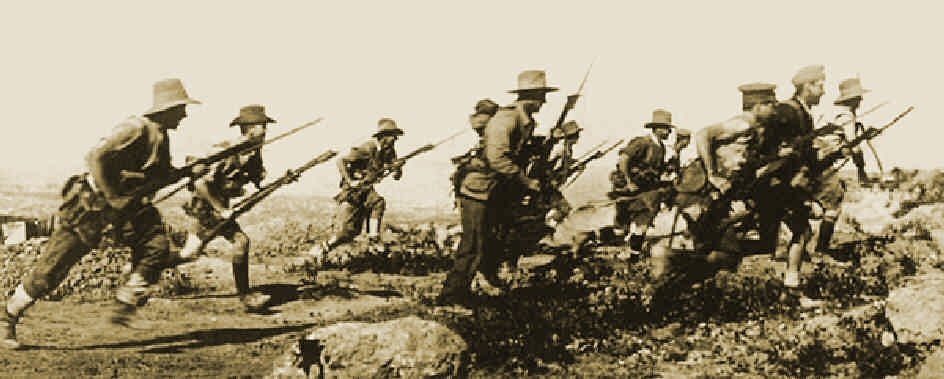
AUSTRALIA'S HISTORICAL DEVELOPMENT
It is a widely held view that Australia became a nation with the formation of the Gallipoli legend. But, much Australian history took place before Gallipoli, when "bush culture" held sway: Australians were seen to live their lives on and of the land. It should be noted, however, that before Gallipoli Australians were essentially British. Even those born here yearned to go and see the "mother country". Antipodeans believed themselves to be Victorians living away from home. The lore of Banjo Paterson and Henry Lawson was as a subculture appended to the overriding Victorian outlook. But, unlike "real" Britons, Australians were not city people. The first Australians, Aboriginals, were accepted as a quaint people soon to fade away.
The Second World War saw the end of identification with Britain - when it lost its power Australian fascination with the culture died; though it must be remembered that Australian history will always be a continuation of British history.
After 1960, the history of Australia became a university subject, important enough of and in itself to be classed as such. "Bushbased" teaching of the nation's history remained at high schools, while the convict era and biographies of city australians were examined at university. History was then put to the test of modern "isms" where modern nationalism and socialism in the Australian context were evaluated. The problem of where Aboriginals fit into this continued and still continues to this day.
It is a widely held view that Australia became a nation with the formation of the Gallipoli legend. But, much Australian history took place before Gallipoli, when "bush culture" held sway: Australians were seen to live their lives on and of the land. It should be noted, however, that before Gallipoli Australians were essentially British. Even those born here yearned to go and see the "mother country". Antipodeans believed themselves to be Victorians living away from home. The lore of Banjo Paterson and Henry Lawson was as a subculture appended to the overriding Victorian outlook. But, unlike "real" Britons, Australians were not city people. The first Australians, Aboriginals, were accepted as a quaint people soon to fade away.
The Second World War saw the end of identification with Britain - when it lost its power Australian fascination with the culture died; though it must be remembered that Australian history will always be a continuation of British history.
After 1960, the history of Australia became a university subject, important enough of and in itself to be classed as such. "Bushbased" teaching of the nation's history remained at high schools, while the convict era and biographies of city australians were examined at university. History was then put to the test of modern "isms" where modern nationalism and socialism in the Australian context were evaluated. The problem of where Aboriginals fit into this continued and still continues to this day.
HISTORY WARS
Background
According to William Stanner, in 1968, Australians suffer from the "Great Australian Silence", where history was recorded in a positive light ignoring what happened to Aboriginals. He claimed that "several hundred thousand Aborigines" had died between 1788 and 1938. Henry Reynolds and Charles Manning Clarke published work in the 1980s and 1990s that to a degree "corrected"" the positive view and supported William Stanner. Geoffrey Blainey criticized this work in Quadrant saying the change from the positive view should not have occurred (ironically, Blainey had been sympathetic to the Aboriginal view of Australian history in Triumph of the Nomads in 1975). An opinion was put forward in the Redfern Park Speech 1992 by ex-Prime Minister Paul Keating (a republican) that before Labor won government with Prime Minister Whitlam in 1972 a string of conservative governments had followed the British colonial approach of subjugating Aboriginals.
A controversial Review of the Australian National Museum was set up by the Howard government in 2003. It looked into the claim that the museum favored the "black armband" view of Aboriginals being dispossessed of their land and rights. Mr Barnett the biographer of John Howard claimed that "many of the Museum's displays were claptrap and Marxist rubbish." The findings of the review found Mr Barnett's accusation to be without foundation. It criticized the museum for treating the arrival of Europeans as a disaster for the continent, and went on to say certain things were omitted. Overall though, it was decided that the museum had shown no bias.
A controversial Review of the Australian National Museum was set up by the Howard government in 2003. It looked into the claim that the museum favored the "black armband" view of Aboriginals being dispossessed of their land and rights. Mr Barnett the biographer of John Howard claimed that "many of the Museum's displays were claptrap and Marxist rubbish." The findings of the review found Mr Barnett's accusation to be without foundation. It criticized the museum for treating the arrival of Europeans as a disaster for the continent, and went on to say certain things were omitted. Overall though, it was decided that the museum had shown no bias.
Debate
There is an issue in Australian historiography of a causative nature: Is European encroachment on this land the cause of the Aboriginal condition? Has there been a clash of cultures with one culture losing out? The implication being that if two cultures cannot exist side by side, one must have won out over the other by force. So white people have intentionally dominated Aboriginals. Then, therefore, white people should feel guilty about what they have done. This whole problem was brought to the fore by John Howard. the Prime Minister of Australia. in 1996. He refused to apologize to the Stolen Generation (even though his government had passed a motion of reconciliation) and announced that Australians should not take the "black armband' approach of feeling guilty about the past. He said the respect given to historian Manning Clark was "nauseating”. White Australians are not guilty of anything and should just celebrate Australia's achievements. He quoted historian Geoffrey Blainey who in the 1993 Sir John Latham Memorial Lecture had coined the term "black armband" for the belief that Australia had been invaded and White people should show remorse for what had been done to Aboriginals. Geoffrey Blainey was actually crticising both sides of the debate, though he accused Manning Clark of causing the problem. It should be noted that John Howard promoted ‘History warriors" who were unympathetic toward the Aboriginal view, to senior positions on government boards: Keith Windschuttle to the board of the ABC; Janet Albrechtsen ABC; and Ron Brunton ABC.
John Howard's statement was far too simplistic for some. Many white Australians do feel guilty about the way Aboriginals have been treated. Aboriginals are clearly worse off in a two-tier society. A significant proportion of Australians feel that Europeans took over this country in an imperialistic manner and have practiced racism - exploiting Aboriginals.
Perhaps this shock announcement by John Howard was to do with the conservative domination of politics in the late 1990s. Conservative academics believed that they had the right to condemn all such thinking about the "White versus Aboriginal" issue as being "left-wing fraud" (term first used by Robert Manne). Academics were divided into two camps: 1) Aboriginal Dispossessionists (black armband), who believed that Aboriginals had been wronged; and 2) and "Three Cheers" (everything that happened was good) group associated with Quadrant magazine who believed Aboriginals had brought it on themselves.
In 2002 Keith Windshuttle editor of Quadrant questioned the number of Aboriginals claimed to have been killed during colonization and criticised Henry Reynolds for his pro-Aboriginal writings. Apparently, Mr Windshuttle was outraged by the film Rabbit Proof Fence which told a story through the eyes of three children of the Stolen Generation. Mr Windshuttle published a book claiming the "genocide" of Tasmanian Aboriginals did not happen. This book was to be the focal point for the History Wars. Professor Robert Manne countered Keith Windshuttle's argument by showing that Windshuttle's book was fabricated, in his book Whitewash: On Keith Windschuttle's Fabrication of Aboriginal history 2003, ed.R. Manne. He said, ""I thought there was a responsibility to argue against it and to mount the evidence where I thought it was clearly wrong." Ignoring the black armband interpretation is to conveniently forget things that happened in Australian history.
Stuart Macintyre in his book (written with Anna Clark) The History Wars published in 2003 said that the history wars debate had damaged the objectivity of Australian history. Unfortunately, this work was not impartial and clearly favored the black armband side. Greg Melleuish countered by saying Macintyre was "partisan" (John Howard had used the term "partisan' years earlier) Keith Windshuttle also responded and said Macintyre''s book tried to "caricature the history debate". Geoff Melleuish also later said ("intellectuals in the Australian Press" 2005) that Robert Manne (see below) was a naive left--winger for saying John Howard was "the most conservative government in Australia for over 40 years."
In 2009 Prime Prime Kevin Rudd of the Labor Party entered the fray and said it was time for a truce to be called. He said that our forebears were "not" all of "absolute nobility", but the achievements of our pioneers and entreprenuers should be celebrated. He went on "...these are all part of the rich fabric of our remarkable story called Australia." He maintained that those who adopted the chronological path and did not interpret the truth should reassess themselves and those who interpreted everything without acknowledging that Australian history was a succession of chronological events should change as well.
Professor Robert Manne added "So that if we can end what I think is something associated with culture wars and is associated really with a period of neo-conservatism; if we can end that then we're much (more) likely to get much better and nuanced history." This comment was "out of order" because he was editor of the right wing Quadrant Magazine from 1989 to 1997. Chosing him as editor must have been a mistake.
Ironically, Australian voters have relinquished the neo-conservatism of the 1990s by electing a Labor government.
It is presumed that the black armband approach has been completely dumped by the new educational curriculum for high schools with history to be taught from both the Aboriginal and White perspectives; see "politically correct". This is in error. Because both sides are being taught it validates the black armband view.
The new year 9 curriculum evaluates history from 1750 to 1901 with emphasis on it being seen through Aboriginal and Torres Straight Islander eyes. Aboriginal sources are accepted. The most controversial phrase was to study "the consequences of contact, intended and unintended, between Aboriginal and Torres Strait Islander people and Europeans in Australia..."
Year 10 students will study the "civil rights struggles of Aboriginal and Torres Strait Islander people with reference to government policies (including protection, assimilation, integration, reconciliation and self-determination), the 1967 Referendum, the Mabo decision and the apology to the Stolen Generations" (sic).
Despite the expression "protection, assimilation, integration, reconciliation" nothing in the wording of the curriculum negates the black armband view of Australian history. It should be noted that the current government has apologized to the Stolen Generation, and in 2006 John Howard claimed that universities are controlled by the Left. Debate now ensues over whether the evidence used in historical writing is sufficient and correct.
John Howard's statement was far too simplistic for some. Many white Australians do feel guilty about the way Aboriginals have been treated. Aboriginals are clearly worse off in a two-tier society. A significant proportion of Australians feel that Europeans took over this country in an imperialistic manner and have practiced racism - exploiting Aboriginals.
Perhaps this shock announcement by John Howard was to do with the conservative domination of politics in the late 1990s. Conservative academics believed that they had the right to condemn all such thinking about the "White versus Aboriginal" issue as being "left-wing fraud" (term first used by Robert Manne). Academics were divided into two camps: 1) Aboriginal Dispossessionists (black armband), who believed that Aboriginals had been wronged; and 2) and "Three Cheers" (everything that happened was good) group associated with Quadrant magazine who believed Aboriginals had brought it on themselves.
In 2002 Keith Windshuttle editor of Quadrant questioned the number of Aboriginals claimed to have been killed during colonization and criticised Henry Reynolds for his pro-Aboriginal writings. Apparently, Mr Windshuttle was outraged by the film Rabbit Proof Fence which told a story through the eyes of three children of the Stolen Generation. Mr Windshuttle published a book claiming the "genocide" of Tasmanian Aboriginals did not happen. This book was to be the focal point for the History Wars. Professor Robert Manne countered Keith Windshuttle's argument by showing that Windshuttle's book was fabricated, in his book Whitewash: On Keith Windschuttle's Fabrication of Aboriginal history 2003, ed.R. Manne. He said, ""I thought there was a responsibility to argue against it and to mount the evidence where I thought it was clearly wrong." Ignoring the black armband interpretation is to conveniently forget things that happened in Australian history.
Stuart Macintyre in his book (written with Anna Clark) The History Wars published in 2003 said that the history wars debate had damaged the objectivity of Australian history. Unfortunately, this work was not impartial and clearly favored the black armband side. Greg Melleuish countered by saying Macintyre was "partisan" (John Howard had used the term "partisan' years earlier) Keith Windshuttle also responded and said Macintyre''s book tried to "caricature the history debate". Geoff Melleuish also later said ("intellectuals in the Australian Press" 2005) that Robert Manne (see below) was a naive left--winger for saying John Howard was "the most conservative government in Australia for over 40 years."
In 2009 Prime Prime Kevin Rudd of the Labor Party entered the fray and said it was time for a truce to be called. He said that our forebears were "not" all of "absolute nobility", but the achievements of our pioneers and entreprenuers should be celebrated. He went on "...these are all part of the rich fabric of our remarkable story called Australia." He maintained that those who adopted the chronological path and did not interpret the truth should reassess themselves and those who interpreted everything without acknowledging that Australian history was a succession of chronological events should change as well.
Professor Robert Manne added "So that if we can end what I think is something associated with culture wars and is associated really with a period of neo-conservatism; if we can end that then we're much (more) likely to get much better and nuanced history." This comment was "out of order" because he was editor of the right wing Quadrant Magazine from 1989 to 1997. Chosing him as editor must have been a mistake.
Ironically, Australian voters have relinquished the neo-conservatism of the 1990s by electing a Labor government.
It is presumed that the black armband approach has been completely dumped by the new educational curriculum for high schools with history to be taught from both the Aboriginal and White perspectives; see "politically correct". This is in error. Because both sides are being taught it validates the black armband view.
The new year 9 curriculum evaluates history from 1750 to 1901 with emphasis on it being seen through Aboriginal and Torres Straight Islander eyes. Aboriginal sources are accepted. The most controversial phrase was to study "the consequences of contact, intended and unintended, between Aboriginal and Torres Strait Islander people and Europeans in Australia..."
Year 10 students will study the "civil rights struggles of Aboriginal and Torres Strait Islander people with reference to government policies (including protection, assimilation, integration, reconciliation and self-determination), the 1967 Referendum, the Mabo decision and the apology to the Stolen Generations" (sic).
Despite the expression "protection, assimilation, integration, reconciliation" nothing in the wording of the curriculum negates the black armband view of Australian history. It should be noted that the current government has apologized to the Stolen Generation, and in 2006 John Howard claimed that universities are controlled by the Left. Debate now ensues over whether the evidence used in historical writing is sufficient and correct.

A Brief History of the Continent of Australia
There are many individuals who think that the continent of Australia was largely unsettled before its "discovery" by European colonists. Contrary to this belief, the Australian continent was populated by the Aborigines peoples and Torres Straight Islanders.
There are many individuals who think that the continent of Australia was largely unsettled before its "discovery" by European colonists. Contrary to this belief, the Australian continent was populated by the Aborigines peoples and Torres Straight Islanders.
Bendigo, Victoria, Australia - Brief But Rich History
The area was originally known as Bendigo's Creek and named after an employee on a local property who was nicknamed "Bendigo" after the famous English prize fighter William "Bendigo" Thompson. This area was settled in 1851.
The area was originally known as Bendigo's Creek and named after an employee on a local property who was nicknamed "Bendigo" after the famous English prize fighter William "Bendigo" Thompson. This area was settled in 1851.
Australia Telecommunications History
The telecommunications sector in Australia is predominantly saturated by telecoms provider, Telstra. But despite this, space is also a playing ground for other telephone carriers which include Optus, AAPT and Powertel, Soul, Vodafone and Hutchison 3G.
The telecommunications sector in Australia is predominantly saturated by telecoms provider, Telstra. But despite this, space is also a playing ground for other telephone carriers which include Optus, AAPT and Powertel, Soul, Vodafone and Hutchison 3G.
Nine Reasons Why you Should Migrate to Australia
Australia isn't dubbed as one of the top migration destination in the world for nothing. It's a lovely melting pot out there. Australia's shore is open to people from all races and background. It's a fair dinkum* beautiful country.
Australia isn't dubbed as one of the top migration destination in the world for nothing. It's a lovely melting pot out there. Australia's shore is open to people from all races and background. It's a fair dinkum* beautiful country.
Australia Holidays - The Natural Marvel
A beautiful island continent, Australia is a breathtaking land of woodlands, rich grasslands, deserts and mountains, deep blue beaches and oceans. Australia is a country with a continental mainland in the southern hemisphere of Indian and Pacific Oceans.
A beautiful island continent, Australia is a breathtaking land of woodlands, rich grasslands, deserts and mountains, deep blue beaches and oceans. Australia is a country with a continental mainland in the southern hemisphere of Indian and Pacific Oceans.
Scale the Horizons and Date in Australia
Date in Australia; do not be discouraged by the whooping distance between this Secluded continent and the rest of the world. Love does not respect distance. It might be far flung in the deepest interiors of the pacific, but it is a sure love nest.
Date in Australia; do not be discouraged by the whooping distance between this Secluded continent and the rest of the world. Love does not respect distance. It might be far flung in the deepest interiors of the pacific, but it is a sure love nest.
Restaurants in Australia Craft a Culture of Cuisine
Australia has one of the most diversed cultures in the world. The country has kept its cultural diversity preserved, while people live together in harmony. The same thing goes with their cuisine. Australian cuisine inherited its nature from British cooking.
Australia has one of the most diversed cultures in the world. The country has kept its cultural diversity preserved, while people live together in harmony. The same thing goes with their cuisine. Australian cuisine inherited its nature from British cooking.
The Problem of Women and Society
Since the days of old, women have been the target of a lot of attention in the lives of societies. In old Greek, Roman, and Indian societies, the status of women was poor. They did not enjoy the same legal rights as men.
Since the days of old, women have been the target of a lot of attention in the lives of societies. In old Greek, Roman, and Indian societies, the status of women was poor. They did not enjoy the same legal rights as men.
Socialization, Culture, Norms and Values Into a Society
Socialization is a process by which individuals learn the culture of their society, as it is the process of social learning and as such is a lifelong process. Without undergoing this process, an individual would not be defined as normal by society.
Socialization is a process by which individuals learn the culture of their society, as it is the process of social learning and as such is a lifelong process. Without undergoing this process, an individual would not be defined as normal by society.
The Benefits of Australian Living
Located between 10° and 39° south latitude, Australia is the sixth largest nation in the world. It is the only nation to govern an entire continent and outlying islands. Contained within that continent are six states and two territories.
Located between 10° and 39° south latitude, Australia is the sixth largest nation in the world. It is the only nation to govern an entire continent and outlying islands. Contained within that continent are six states and two territories.
Guidance For Moving To Australia
Within Australia the culture and attitude to life is very unique and the country is becoming one of the most popular to relocate to due to its mixture of weather and laid back attitude. This lifestyle is continually seen within popular culture in all forms of media.
Within Australia the culture and attitude to life is very unique and the country is becoming one of the most popular to relocate to due to its mixture of weather and laid back attitude. This lifestyle is continually seen within popular culture in all forms of media.
Enjoying the Great Down Under
As with many people, you have probably dreamed of traveling to the beautiful land of Australia. In Australia there are wonderful beaches perfect for scuba diving or snorkeling, incredibly polite and welcoming locals, and the land is safe and wonderful place to visit.
As with many people, you have probably dreamed of traveling to the beautiful land of Australia. In Australia there are wonderful beaches perfect for scuba diving or snorkeling, incredibly polite and welcoming locals, and the land is safe and wonderful place to visit.
Plunge Into the Australian Water
It is a common knowledge that Australia is one of the most friendly countries to visit because of the great infrastructure and natural resources that they offer to the locals and tourists. Experience scuba diving in Australian waters.
It is a common knowledge that Australia is one of the most friendly countries to visit because of the great infrastructure and natural resources that they offer to the locals and tourists. Experience scuba diving in Australian waters.
Australian Beaches
A beach mecca for tourists, Bondi Beach is the most well known beach in Australia. From sightseers, lifesavers and surfers to sun worshipers, they abound the coast while enjoying the sun, heat and cool azure water. Bondi has the country's oldest life saving club.
A beach mecca for tourists, Bondi Beach is the most well known beach in Australia. From sightseers, lifesavers and surfers to sun worshipers, they abound the coast while enjoying the sun, heat and cool azure water. Bondi has the country's oldest life saving club.
Australian Wool
Where did it come from - The History: It all started in a town called Sydney; the First Fleet sailed in with the very first flock of sheep to hit Australian shores in 1788. The first Merino sheep, which were Spanish, came from South Africa.
Where did it come from - The History: It all started in a town called Sydney; the First Fleet sailed in with the very first flock of sheep to hit Australian shores in 1788. The first Merino sheep, which were Spanish, came from South Africa.
HISTORIOGRAPHY RESEARCH PAPERS
Australian public debate had been dominated by the impending republic. Australian historiography experienced a return to Australia's relationswith Great Britain and the remaining constitutional links with the United Kingdom. Australia's Britishness has been a theme in contemporary Australian histories. In war, dedominionization and republicanism historians have noted the challenges involved in the imperial connection to Australia. During the 1990s historians revisited historical issues relating to Australia's relations with Great Britain. They explore the changing approaches to Britishness in Australian history writing. She examines in detail how historians have interpreted the relationship between British and Australian soldiers during such events as World War I. A comprehensive introduction to key themes in Australian historiography: it cultivates critical research and teaching methodologies by revealing the constructed nature of historical practice and its relationship with crucial aspects of Australian experience -- national identity and nation building, the experience of war, gender relations, and the treatment of the indigenous. What is historiography? Historiography is the study of how historians and others interpret the past - mainly as a study of their writing. It is a fascinating area of debate and argument about previous and current representations of the past. An Australian historiographical controversy is the 'Black Armband' debate about interpretations of indigenous history. More recently we have had the History Wars, a follow-on to the Black Armband debate.











